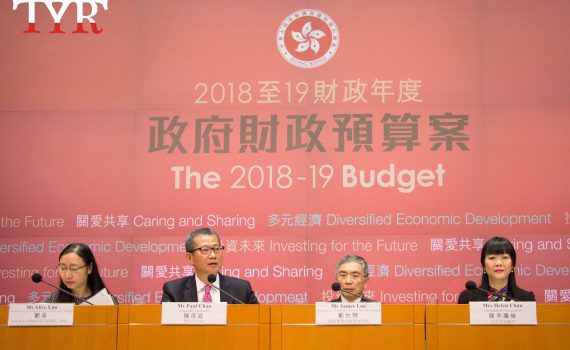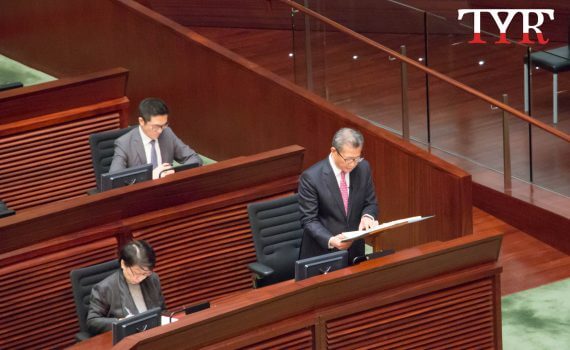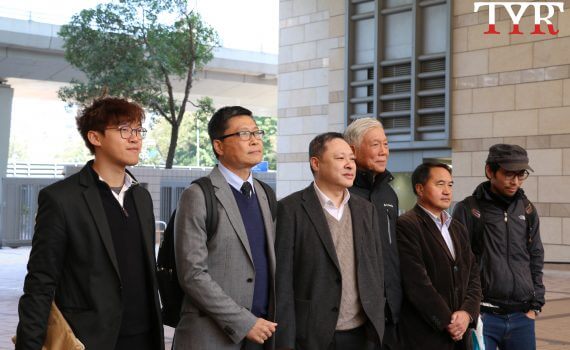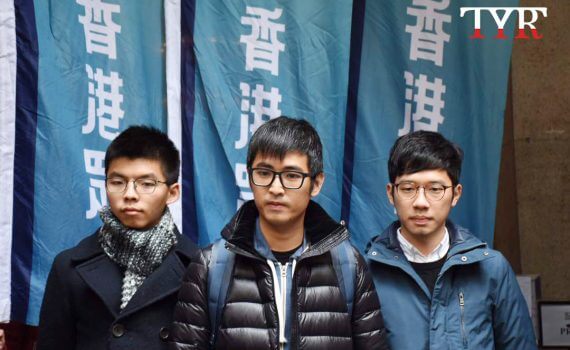Politics

Budget 18/19: Hong Kong financial chief attempts to smarten up tourism
- 2018-02-28
- Politics
- The Young Reporter
- By: Amy Ho、Phoebe Lai、Rachel YeoEdited by: Ezra Cheung、James Edward Allen、Kobie Li
- 2018-02-28
In the hope of developing smart tourism in Hong Kong, Financial Secretary, Paul Chan Mo-po, unveils today an additional provision of $396 million for the industry from last fiscal year's recording-breaking surplus of about $138 billion. This yearly budget proposes allocating $226 million to Hong Kong Tourism Board to implement four strategies to boost tourism. One of them is to refine smart tourism measures in a bid to attract more visitors to the city. The move comes in response to the latest 4.5% decrease, reported by the Tourism Commission in 2016, in visitors from around the world altogether. Smart tourism refers to a series of technologically innovative initiatives implemented to enhance sightseers' at-destination experiences. According to a paper from the International Journal on Networked Business in 2015, big data is employed for analysing current tourism trends. The findings then are used to improve current tourist attractions and to bring better accessibility for travellers. Tourism sector lawmaker, Wayne Yiu Si-wing, hopes Hong Kong could make use of such technology to collect data, such as putting sensors on streetlights to track traffic and pedestrian flows. "We hope that the data collected will allow tourists to make better choices when they visit (Hong Kong)," he said. Hong Kong is currently utilising QR codes and Wi-Fi hotspots for some of the smart tourism measures. However, Mr Yiu highlighted that the government could do more to develop Hong Kong into a smarter tourism destination. "For example, Wi-Fi hotspots in the city are still not fast enough because people may gather to use Wi-Fi in the same spot," he explained. Ling Ho, director of cultural tour agency Ho Ho Go Experience, mentioned past measures implemented by the government to improve IT security for tour agencies. "The government has given several hundred thousand dollars for people to set up …

Budget 18/19: Increased housing supply aims at lessening low-income families' burden
- 2018-02-28
- Politics
- The Young Reporter
- By: Anna Kam、Nadia Lam、Tomiris UrstembayevaEdited by: Raphael Blet、Michelle Ng
- 2018-02-28
Reported by Anna Kam, Nadia Lam and Tomiris Urstembayeva Edited by Raphael Blet Infographics edited by Michelle Ng Financial Secretary Paul Chan Mo-po announced today that the government worked on increasing living space for local citizens. This includes expanding housing space for 210 sites which will supply 310,000 flats, 70% of which will be used for public housing. The government said that it would continue to support the demand and supply of housing in Hong Kong. The International Housing Affordability survey conducted in 2017 ranks Hong Kong as the most unaffordable housing market with a median multiple of over 19. According to a research conducted by Mercer assessing 101 cities, Hong Kong ranked 70th in the world in terms of living standards. Alister Musgrave, the Founder of MoneyHero.com.hk, believes that the overall budget failed to address the public concerns on housing. He cites a research conducted by Demographia and found that Hong Kong has the worst housing affordability in the world for 8 years, which is one of the major problems. Despite the government's initiatives to increase the stamp duty taxation in 2017-2018, the housing property continued to rise and did not falter. Shih Wing-ching, the founder of Centaline Property Agency Limited, said that the market-cooling measures initiated by the government in recent years are not effective in the long run. "Take the Stamp Duty as (an) example, although it discourages the investors to purchase properties, it fails to help the real users to buy flats," said Mr. Shih. Many of these flat owners are investors, with the government taking the initiative to increase both public and private flats at 100,000 and 280,000 respectively. Still, the financial secretary did not roll out any policies to aid first-time home buyers. Mr. Shih suggests that the government should provide more housing supply …

Budget 18/19: the challenges and the road forward in Hong Kong
- 2018-02-28
- Politics
- The Young Reporter
- By: Katherine Li、Wallis WangEdited by: Candice Wong、Wing Li
- 2018-02-28
Reported by Katherine Li and Wallis Wang Edited by Candice Wong Infographics edited by Wing Li The Hong Kong government's budget surplus has reached $138 billion and the fiscal reserves are expected to reach $1.09 trillion, Financial Secretary, Paul Chan Mo-po revealed today in his budget speech. Hong Kong's economy grew by 3.8% over the past fiscal year. The financial secretary predicts that the gross domestic product will increase by between 3% and 4% in the coming year. Mr. Chan said he is "cautiously optimistic" about economic prospects in the coming year, based on the global monetary environment and geopolitical situations. Trends in innovation and technology, the shift in global economic gravity from West to East, protests against free trade and the call for de-globalisation and protectionism pose challenges, Mr. Chan pointed out. "To stay ahead of the game, we must enhance our I&T (Innovation and Technology) environment (and) attract companies from new economic sectors and research institutions to set up their presence in Hong Kong," Mr. Chan said. To overcome these challenges, Mr. Chan proposed to set aside $50 billion for I&T development. An additional $10 billion will be injected into a Technology and Innovation Fund, $500 million of which will go toward a Technology Talent Scheme. To fight protectionism, Mr. Chan called for more cooperation with the Mainland while maintaining a competitive tax regime. "The Belt and Road Initiative and the Bay Area development serve to enlarge the hinterland for business development of our enterprises and expand our market coverage," Mr. Chan said. However, legislator and practising tax lawyer, Kenneth Leung Kai-cheong warned about the risks for Hong Kong. "I believe we should diversify Hong Kong's market," Mr. Leung said, "because protectionism sentiment and the change of interest rate in the US will affect trade and investment." He …

Budget 18/19: healthcare expenditure increased while no specific plans on mental health mentioned
- 2018-02-28
- Politics
- The Young Reporter
- By: Vanessa Yung、Oasis LiEdited by: Elly Wu、Kenji Chan
- 2018-02-28
Reported by Vanessa Yung, Oasis Li Edited by Kenji Chan Infographics edited by Elly Wu Financial Secretary Paul Chan Mo-po announced to increase the public healthcare services expenditure to HK$ 71.2 billion, accounting for 17.5% of total recurrent expenditure. The government provided the Hospital Authority with nearly $6 billion to increase the number of hospital beds, operating theatre sessions, the quota for general out-patient and specialist out-patient services and the manpower required. Because of the increasing demand for healthcare services, the government has invited the Hospital Authority to start planning the second 10-year hospital development plan, which is expected to deliver 3,000 to 4,000 additional hospital beds and provide additional facilities and quota for consultation. A sum of $300 billion as an initial provision is set to support this second 10-year hospital development plan, as well as improving the clinic facilities in Department of Health, upgrading and increasing healthcare teaching facilities. To address the shortage of manpower in hospitals, the government is discussing with the University Grants Committee to increase publicly-funded training capacities for doctors, nurses, dentists, and relevant allied health professionals in the coming three years. "I will ensure that the Hospital Authority has adequate resources to employ all local medical graduates," Chan said. Yuen Wai Kit, the spokesperson for Health Policy Concern, thinks the government should not only be focusing on the shortage of doctors. "The budget allocated resources to increase the number of doctors. What about other medical manpower such as nurses and occupational therapists? The society lacks all sorts of medical manpower instead of only lacking doctors," said Yuen. Mental health care is not mentioned in the budget. Hong Kong currently has 240,900 people suffering from mental illness, of whom 32,000 are teenagers, while the Hospital Authority is not providing a stable support for mental health …

The court rejects dropping double incitement charge against Umbrella Movement defendants
- 2018-02-13
- Politics
- The Young Reporter
- By: Wallis Wang、Oasis LiEdited by: Ezra Cheung、Zinnia Lee
- 2018-02-13
The charge of inciting people to incite others to commit public nuisance against the "Occupy Central" founding trio, Benny Tai Yiu-ting, Chan Kin-man and Chu Yiu-ming, was ruled "constitutional" by the court this morning. Judge Johnny Chan Jong-herng believed that the charge "exists in the common law", saying that there is nothing "uncertain" and "unconstitutional" of the charge. The trio, Tai, Chan and Chu, was accused of three charges altogether: (1) conspiracy to commit public nuisance, (2) incitement to commit public nuisance and (3) inciting people to incite others to commit public nuisance. Defence Senior Counsel Gerard McCoy had argued that the third charge, inciting people to incite others to commit public nuisance, was neither justiciable nor constitutional in previous trials, and thus proposing a motion to rescind this charge. The judge was not convinced though, saying that inciting people to incite others is different from inciting to commit public nuisance and "cannot be treated in one single charge". Chan Kin-man, one of the Occupy Central founders, expressed his disappointment to the court after the hearing. "We are disappointed that the court accepts the incitement to incite is a lawful charge in this case," he said. "This is unprecedented." McCoy had previously argued that the prosecutor failed to provide detailed information such as the identity of involved people. But the judge stated that the prosecutor had made it clear. "Adequate and appropriate information has been given," said the judge. There had been a discussion about whether the single trial for the nine defendants could be split. The judge eventually decided to stay as a bound trial, implying that all nine defendants are to be tried and testified together even though Raphael Wong Ho-ming and Lee Wing-tat were accused of committing the crimes in places different from the rest. The judge also compared the incitement to a …

Democracy activists Joshua Wong, Alex Chow and Nathan Law set free by Court of Final Appeal
- 2018-02-06
- Politics
- The Young Reporter
- By: Katherine LiEdited by: Angie Chan、Michelle Ng
- 2018-02-06
Alex Chow, Joshua Wong, and Nathan Law walk free as Court of Final Appeal accepts their appeal this afternoon. The trio was initially arrested for breaking into the Central Government Offices and for "civil disobedience" in September 2014, which triggered the Occupy Central. However, Wong said that even though they regained their freedom, this is by no means a victory for democracy. "This set the precedent of demonstrations being viewed as violent," Wong said, "which puts all future attempts of public assembly at risk. Those who attend may receive months or years of jail sentence." Furthermore, Chow said that the lines of what is considered as violent demonstration has been blurred through this case, which is unhelpful to Hong Kong's fight for democracy. He called the court's ruling "sugar coated". The trio raised concerns that with the recent disqualification of Agnes Chow, Hong Kong is going through a very tough time. Alex Chow ultimately said that it is obvious that people in the government are under pressure to behave a certain way. The trio is free for now. But Joshua Wong faces another appeal for "contempt of court" which will soon decide whether he remains free or goes back to jail.

People not satisfied with new scheme for low-income families
- 2017-12-07
- Politics
- The Young Reporter
- By: Susan Gao、Melissa KO、Kenji ChanEdited by: Susan Gao、Melissa KO
- 2017-12-07
Hong Kong Chief Executive Carrie Lam Cheng Yuet-ngor has introduced several policies to ease the plight of low-income families in her maiden policy address today, while many of those families are dissatisfied and argue for more. The city's first female leader proposed to "significantly enhancing" Low-income Working Family Allowance (LIFA) starting from April 1, 2018. Under the new policy, with a few more requirements being satisfied, the monthly payment for a four-person household with two children will increase by 23% from the current $2,600 to $3,200, said the Chief Executive. Ivan Wong Yun-Tat, the Vice Secretary of Neighbourhood and Worker's Service Centre and the district councilor of Kwai Tsing, said that Carrie Lam has responded to the grassroots' aspiration but "the benchmark duration of working hours for the scheme is still higher than expected." The new scheme requires all family members in a four-person household to have no less than 192 total monthly working hours, whereas Wong said 72 working hours per month is the most ideal amount. An open forum discussing Carrie Lam's first policy address was held in Kwun Tong Methodist Social Service today. It was jointly organised by 20 social welfare concern groups with Wong as one of the organisers. The neighbourhood, several political parties and concern groups turned out en masse the event, urging the government to do more for the disadvantaged groups. Mrs. Lam, a full-time housewife having been received the allowance for several years said she was not satisfied with the scheme because her daughter has autism. She suggested that the government should do more, especially to support those low-income families of a child with special needs. Anthony Wong, the business director of the Hong Kong Council of Social Service, said the families of "N have-nots" tended to benefit the least from the updated …

Highlights on Carrie Lam's responses in her press conference
- 2017-10-12
- Politics
- The Young Reporter
- By: Sharon PunEdited by: Isabella Lo
- 2017-10-12
Chief Executive Carrie Lam Cheng Yuet-ngor further justified her plans for Hong Kong in a press conference Wednesday afternoon, following the announcement of her first policy address in the morning. Responding to the saying that her policy address highlights only livelihood issues but avoids political matters, Lam said Hong Kong has not had a proper atmosphere for such a discussion yet. Lam mentioned the acts of some legislators that morning in the Legislative Council, which she considered as disrespect, are a sign indicating that the city is not ready for much political discussion. She said political reforms, especially those regarding Article 23 and universal suffrage, could only be progressed when time is suitable. Concerning measures to ease housing problems, Lam said the best way for now is to increase the supply of flat units. She promised to make transparent discussions in the near future to confirm how the schemes can work feasibly in detail. While public doubts if the "Starter Homes" plan could solve pressing issues related to housing soon, Lam clarified that it is more important to provide every the opportunity in purchasing flats. Another focus of Lam's address is regarding to innovation and technology. Lam agreed that the industry in Hong Kong has been lagging behind that in the Mainland for years. Apart from the increase in research and development funding, Lam said she will put in extra effort to this field by supervising the whole process of development herself. Regarding Hong Kong audience booing the national anthem at a football match on Monday, Lam thought the irrational audience are only the minority of the whole. She reaffirmed that Hong Kong is part of China and such acts are considered deeply disrespectful to the home country.

Activists call for support of jailed mainland dissidents
- 2017-10-05
- Politics
- The Young Reporter
- By: Raphael Blet、Tracy Zhang、Jade LiEdited by: Lam Ka Sing、Tracy Zhang
- 2017-10-05
An activist group organised a temporary exhibition in Hong Kong's Tsim Sha Tsui Wednesday evening, calling for support of jailed activists in mainland China. The Hong Kong Alliance in Support of Patriotic Democratic Movements of China hopes the Democracy Lantern Action can make the public pay more attention to the "patriots" in custody and the human rights issue in the mainland, said Richard Tsoi Yiu-cheong, vice president of the organisation, referring to dissidents such as the 709 lawyers, a group of lawyers under government surveillance. The number 709 refers to the fact that the lawyers were arrested on July 9 in 2015. "The annual event we hold next to the Tsim Sha Tsui harbour every year at Mid-Autumn Festival is to advocate for those in custody who cannot get united with their family members," he said. "We also hope to increase awareness on the suppression on the defendants of human rights in mainland on the night of a traditional Chinese festival when people unite with their family members," he added. Chow Hang-tung, barrister and vice president of the Hong Kong Alliance, also regarded the Mid-Autumn Festival as a symbolic time to call for the activists' reunion with their families as it is when Chinese families traditionally gather to celebrate. "The most vocal lawyers have been either placed in jail or put on probation since the 709 crackdown, severely reducing the number of human rights lawyers who can still work effectively" said Chow, who believes that the situation for mainland human rights lawyers has worsened since the jailings in 2015. The alliance has delivered moon cakes to the Liaison Office of the Central People's Government on Chinese National day on Monday, asking for the release of jailed mainland dissidents to reunite with their families. …

